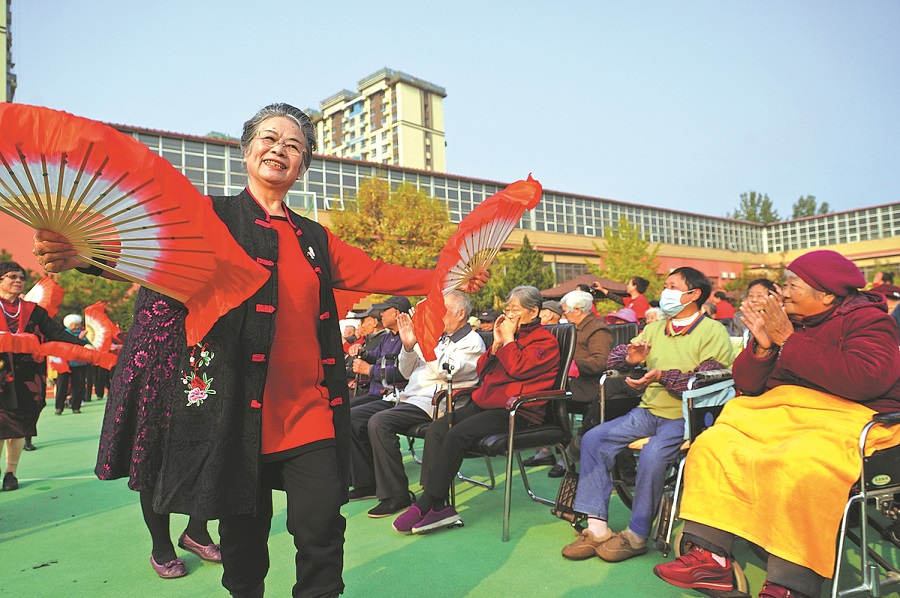Lawmaker stresses long-term care cover

Older performers dance at an event held by the Beijing Folk Custom Museum to celebrate the Double Ninth Festival in Beijing on Oct 23. CHENG GONG/FOR CHINA DAILY
China should integrate long-term care as a distinct category into its Social Insurance Law to foster high-quality development of the elderly care industry, said a national legislator on Tuesday.
A unified and standardized financing mechanism would help optimize the use of funds from individual medical insurance accounts and coordinate the management and intensive use of various national funds related to elderly care, ensuring sufficient financing sources for long-term care insurance, said Yu Xubo, a deputy to the 14th National People's Congress and board chairman of China General Technology (Group) Holding Co Ltd (Genertec), a Beijing-headquartered centrally administered State-owned enterprise.
With an aging population, China can use long-term care insurance to provide financial or service support toward basic living care and medical nursing of people with disabilities, serving as a crucial addition to the multilevel social security system, said Yu.
Since its inception in 2016, long-term care insurance has covered 170 million people in China, with over 2 million beneficiaries receiving support. The program has notably reduced the annual per capita economic and administrative burden on families with members with disabilities by approximately 14,000 yuan ($1,945), demonstrating substantial success in pilot projects, statistics from the National Healthcare Security Administration showed.
However, challenges remain in specific implementations, including unclear financing responsibilities, inadequate operation and management mechanisms, as well as insufficient coordination among various types of social security functions related to elderly care.
Yu said that the implementation of the long-term care insurance system is anticipated to significantly alleviate the financial strain on families and, to some extent, prevent financial strain caused by long-term care.
"This mechanism will also foster the family care model, diminishing the prolonged reliance of chronic diseases on hospitals and effectively distributing and utilizing scarce medical resources," said Yu, adding that it will offer policy support, funding avenues and consistent business opportunities for the growth of nursing institutions.
In addition to running businesses in the areas of advanced manufacturing and technical services, Genertec owns 403 medical institutions with over 52,000 beds in 27 provinces, autonomous regions and municipalities across China, and operates 518 clinics across the country.
Yu also urged the government to expedite the development of national standards for the valuation of scientific and technological achievements to address systemic issues across sectors, fields and industries. This involves researching valuation methods, models and technologies to ensure scientific and practical valuations, leading to the establishment of national standards.
He said this initiative would encourage the involvement of qualified SOEs and establish a mechanism for the collection and exchange of information on technological achievements and transactions.
Similar views were expressed by Zhou Lisha, a researcher at the Institute for State-owned Enterprises of Tsinghua University. "Efforts should also be made to explore and master practical evaluation systems, norms and processes, aiming to develop operable and replicable valuation methods for widespread application."
- Top legislature schedules standing committee session for late February
- China's top legislator meets with Uruguayan president
- Senior legislator surveys Anhui on formulating outline of provincial 15th Five-Year Plan
- China's top legislator meets with British PM
- NPC deputies see more engagement with top court



